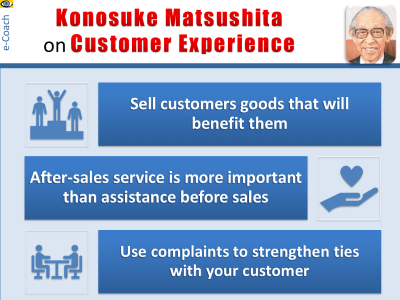|
1 |
The
mission of the company is to
enrich society |
|
2 |
Company’s vision must be driven by the aspirations
of its
customers |
|
3 |
In the long run, the public opinion is right |
|
4 |
Don’t
sell customers goods that they are attracted to; sell them
goods that will
benefit them |
|
5 |
Treat your products like your children |
|
6 |
Any
waste will increase the price of the product |
|
7 |
Stick to fair
prices |
|
8 |
After-sales
service is more important than assistance before sales;
it is through such service that one gets
permanent customers |
|
9 |
Use complaints to strengthen ties with
your customer |
|
10 |
To be out-of-stock is due to carelessness; if this happens,
apologize to your customers, and deliver the goods as soon as you
can |
|
 |
 |
|
Put the Customer First
Konosuke Matsushita
never lost sight of the importance of putting the
needs of his
customers
and the public first. Panasonic's vision of the digital future is driven by
the needs and aspirations of its business customers and consumers around the
world who use their products every day.
|
|
|
|
|
Treat Your Products Like Your Children
Konosuke Matsushita had
extraordinary
passion
for both manufacturing and the products his company made. "The goods we make
here every day," he would tell his employees, "are like children we raise
with tender care. Selling them is like seeing those children grow up and go
out into the world. It is only natural, then, that we should be concerned
about how they are getting on in their lives, and so go and see for
ourselves."
Matsushita believed that maintaining this concern for what you
produce is the first step toward building an ordinary
supplier-client
relationship into a stronger link based on mutual trust.
Complaints Strengthen Ties
Far from being an attack, a complaint should be
treated as a valuable
opportunity to strengthen ties. "Naturally I'm
delighted when a buyer expresses compliments," Konosuke Matsushita would
say, "but I'm just as pleased to get a letter of complaint." His reasoning
was that if customers didn't bother to complain, that meant they had already
decided not to buy any more products from your company. If, on the other
hand, they expressed their dissatisfaction, even to the point of seriously
considering going elsewhere for their needs, they were still interested.
|
|
| |
People Before Products
Konosuke Matsushita kept saying, “We produce
people,
and we also produce electrical goods." He always believed that the measure
of a company was the people who worked for it, that no enterprise could
succeed if its employees did not grow as human beings, and that business,
first and foremost, was about cultivating human potential.
|
|
|
| |
No
matter how much capital, technology or equipment an enterprise boasts, it is
bound to fail if its human resources are not developed. And Matsushita did
not mean merely improving employees' technical know-how, management, or
sales skills, though these are certainly part of the concept. For him, the
true aim of personnel development was to cultivate individual self-reliance
and responsibility, to guide employees to an understanding of the value and
significance of their own work and of the obligation of the company to
contribute to society.
|
|
Japan
Competitive Advantage of
Japanese Firms
TQM in
Japan
Kaizen
Kaizen
Mindset
Toyota
Production System (TPS) |
|
|
|